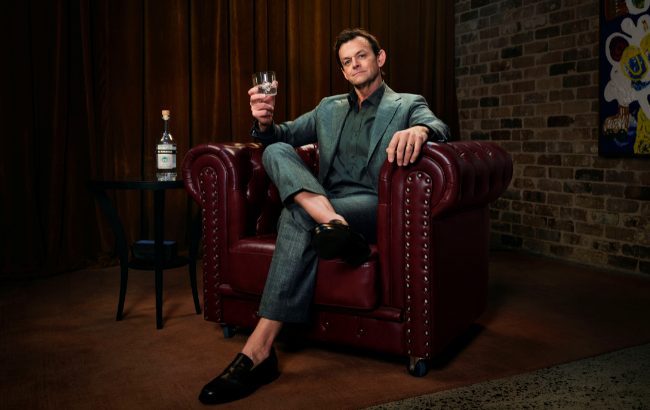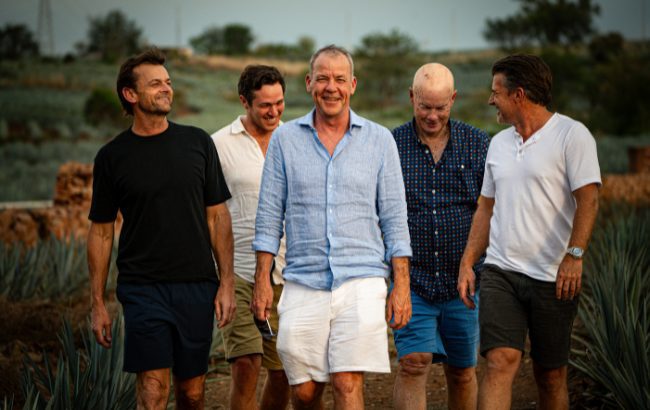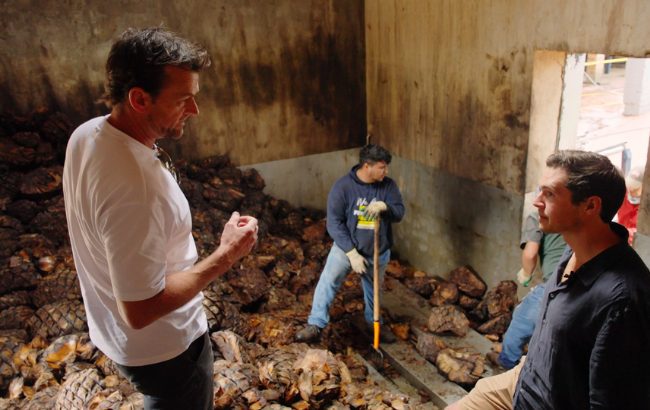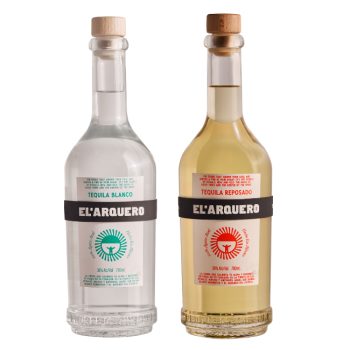Cricket icon Adam Gilchrist’s new innings with Tequila
By Rupert HohwielerFor Adam Gilchrist – one of cricket’s greats – life after the game has unfolded in a new direction entirely, with his own Tequila brand, El Arquero.

“I’ve always joked about having a crack at a label and then around two-and-a-half years ago, my wife [Mel Gilchrist] said: ‘Right, either put up or shut up’,” he tells The Spirits Business about taking the plunge into the spirits world with El Arquero.
Gilchrist, who often goes by the nickname ‘Gilly’, confesses he’s had a love for the Mexican agave spirit for a “long, long time”, but like many, he had a “bad experience when I was far too young”.
“I managed to fight back and find decent premium Tequilas. Starting my own brand has always been something of interest to me,” he says. “I know Tequila is trending at the moment, but I was a fan even through the bad times. It’s been a dream of mine to do this for about 10 years, and we put a lot of time and effort and resources into bringing it to reality.”
The name El Arquero is a subtle reference to his past as a cricketer, with one of the translations from Spanish to English being ‘the keeper’, which was the role he revolutionised in the sport as Australia’s wicket-keeper for nearly 20 years.
Along with wife Mel, the founding group includes industry veterans Eddie Brook of Cape Byron Distillery and Dan Fitzgerald of Fourth Wave Wine, as well as friends Stephen Atkinson (Gilchrist’s former manager) and John Eastham.
“We’ve got a balanced skill set among our founders, who all contribute in different ways,” Gilchrist says. “One’s an accountant, one’s a lawyer, one’s a distiller and one has built wine brands previously. I’m trying to work out what I bring.”
Gilchrist says a big challenge for the team was finding someone to manage sales. The founders took a “bold play” and hired a national sales manager “long before we’d even sold a bottle, unfortunately”. That was Geoff Crossman, who had been at Campari for 13 years in sales manager roles.
“He’s ex-Campari and has been in the industry for 25 years, so he knows it well. He’s been heaven-sent,” Gilchrist says.

Gilchrist and the team set out to Jalisco last year to find a distillery that would build the right profile, opting for the Báñuelos family at Destiladora de Los Altos (NOM 1412).
“The grandfather of our distiller was the founder of Cazadores,” he says. “That’s a brand that’s done really well; it was acquired by Bacardi in 2002.”
The team engaged with a consultancy group that brokered introductions to eight distilleries, four in the Highlands of Jalisco and four in the Tequila valley.
“We tasted all the liquids they make for their home brand and learned a bit about them. Then we told them a bit about us and what we were aspiring to achieve,” he says. “From that, we had to whittle it down and find one to partner [with] and this distillery – with the family history and the heritage in distilling – was proven in what it does.”
For the range, Gilchrist has started with a blanco and reposado aged for five months in American oak ex-Bourbon barrels, while an añejo sits in barrels ahead of a release next year.
“I always want to taste the blanco, just to get an idea where it starts,” he says. “We were really keen to try and tailor a liquid profile for people in Australia, particularly, who are a bit non-committal with Tequila. They’ll always say it burns too much, it’s too hot and aggressive at the back end of the taste.
“So we wanted to try and develop something that takes a bit off the heat and that strong ethanol alcohol burn at the back of the taste, without losing any of the impact.”
That’s not to say El Alquero doesn’t pack a punch. “I mean it’s Tequila, it’s a spirit – you still want it to have a little bit of oomph,” he adds.
The brand takes 20% of the liquid from its initial blanco batch and rests it in oak for 20 days. The rested Tequila is then blended into the remainder of the blanco. “We found it eased off that aggressive, really high-impact alcohol at the back end of tasting. It brought in naturally produced creamy vanilla notes that a lot of Tequila companies can achieve typically with additives and flavouring and so on,” he explains. “Which is fine if there’s demand for that, but we were really hellbent on being additive-free.”
The brand claims it’s verified as 100% additive-free by the Additive Free Alliance. Gilchrist adds: “We are just agave, yeast and water – that’s our liquid profile.”
Australia’s budding relationship with Tequila
Compared with the US and even the UK and Europe, Australia is still a fair bit behind in how general consumers perceive Tequila. The spirit is perhaps still in its image makeover phase.
“I would describe Australia as a relatively immature market for Tequila,” Gilchrist says. “It still gets a dud rap that it’s a two-trick pony where it’s only in Margaritas, or it’s only a late-night shot where you’re getting hammered.
“Obviously, it’s so much more versatile than that, particularly in the premium tiers and that’s what we are. We’re playing in this premium space, but we’re not out of reach. We’re not claiming to be an AU$300-$400 bottle, we’re sitting around that sort of AU$100 range.
“That’s a stretch for some people, we know, but we hope that they find it’s worth stretching for.”
Although Australia is highly regulated, Gilchrist maintains that El Alquero hasn’t yet faced major hurdles in getting the product in from Mexico. “It’s effectively coming from the other side of the world, so transit times are probably the biggest challenge, but hopefully we can get ourselves into a system that has order and regularity to it,” he says.
“As far as getting it in, there are tariffs and taxes that we need to pay. We were very aware of those before we started, and that’s just part of the cost of goods really, but we factor that into our pricing, and certainly what we feel is a fair and reasonable deal for our customers.”
Branding-wise, Gilchrist says he’s going for the common ground in lifestyles between Mexico and Australia. “It’s featured around the sun, outdoor lifestyles, beaches, fiestas, barbecues – that’s what our branding is all about.”
Being viewed as premium is important, but equally so is being seen as approachable: “We want to be a vibrant, energetic type of brand that can sit on a premium shelf alongside premium brands, but also one that people can resonate with. They can grab a bottle with some sodas and juices and go down to the beach and pour it in a Highball glass with ice, and still have a good time.
“We’re trying to be pretty versatile, but there’s no doubt our liquid stacks up as a premium liquid.”
Australia is also becoming an agave-growing region in its own right – with brands such as Act of Treason and Beudi. However, the idea to draw from home, or be ‘Australia-made’, was never of interest to Gilchrist.
“Not for a moment am I bagging what people are doing,” he clarifies, “but my whole aspiration and inspiration for this was to do something authentically produced in Mexico, because that’s what I love about Tequila.
“One, you can call it Tequila, and two, it’s got all that heritage and history. That’s what interested me. I don’t want to become an agave farmer in Australia. I’ll leave that to the experts.”

Global goals
Gilchrist is also aware of the scepticism surrounding spirits brands created by celebrities, especially with high-profile people in the US and Tequila. He also doesn’t classify himself with that status. He is Australian for one, but he also adds: “We were very conscious that at the end of the day, it’s what’s in the bottle that’s going to have to stand up – that’s the biggest thing, first and foremost. You have a quality liquid and build a brand around that.
“We knew we had to build a brand that can stand on its own and not just be Adam Gilchrist, the ex-cricketer’s brand. We do want to look overseas outside of Australia eventually – to the UK, India, New Zealand and up into Asia, in Singapore, where we’re really keen.
“We want to get a foundation set here first, but I know there are a lot of people in those countries who don’t have a clue who I am. We have to build a quality brand and make the story authentic. I’m the founder and the major shareholder, so I haven’t been paid to come in and endorse this.
“That’s the way I sell it most in terms of hopefully not being bracketed as a ‘celebrity Tequila’.”
The feedback has been so far, so good for Gilchrist, who’s managed to get the brand stocked at Caretaker’s Cottage, one of Melbourne’s most reputable bars. “They wouldn’t agree to take us on if they thought it was rubbish,” he says, “so that’s a nice validation of what we’re doing.”
His focus is on solidifying the brand in both retail and on-trade channels. “Independent retailers and both the national groups of retail outlets have taken us on board, but we’ve also got a real focus on cocktail bars, restaurants and hotel groups.”
He also talks about the importance of being well-received on back bars and on cocktail lists. “We know that the best way to win retail is to have people drinking it in on-trade venues first and getting it on their lips. That transfers, hopefully, into sales for retail as well.”
“It’s a big cycle that everyone plays their part in,” he says, and also one that he feels has been his biggest learning as a newcomer to the industry.

“It’s not just a case of: ‘Right, get it on a shelf and your job’s done’. You’ve got to help and partner with these venues to introduce it to customers, make it an attractive proposition, let them feel like they’re getting quality, but also value.”
Gilchrist has been on the ground getting the word out, personally meeting pub owners both small and large, including groups that operate 50 venues. “And everything in between,” he stresses.
However, Gilchrist and the team won’t be doing anything preemptively. “We just want to get a foundation set,” he says. “Compared with the big brands, we are an absolute drop in the ocean, but we hopefully can get established. That was very much part of partnering with the distiller that we have.
“They’ve just grown their operation, so if we do need to scale up, we feel comfortable that they’ve got the capacity, and to do it in a manner that we can still have the premium experience in the bottle, and still produce a decent volume while not losing any of that authenticity.
“We’re effectively a startup company. The biggest challenge, and it’s a nice compliment, is being able to work out if we’re capitalising on the size of the opportunity that has been afforded,” he adds.
“We’ve been overwhelmed by the support of people wanting to stock us.”
Related news
Cincoro creates LA Lakers Tequila bottle
